“Why is she so young and beautiful, instead of being a decaying mess?”
“I’ve got to get to Collinwood,” says condemned criminal Quentin Collins, heading for the door of his makeshift hideout.
“No, no,” Joanna urges. “The police are watching Collinwood!”
Quentin considers this. “No, I know what I can do,” he decides. “I can reach the estate through the back forty. The woods are very thick there.”
His wounded sidekick moans, “Quentin, Gerard is at the house. And Samantha would turn you in, if she saw you there!”
“I’ve got to take that chance,” says Quentin, and somewhere in Vienna, an angel gets its wings.
So I have a whole bunch of questions, beginning with: Collinwood has a back forty?
That is brand new information, as far as I’m concerned. Apparently, there’s yet another secret way to sneak into Collinwood that allows you to bypass the police detail that’s been posted around the grounds, who are looking for specifically you, doing specifically this.
I mean, it is the Collinsport police force, who are not celebrated for their powers of observation. Right now, they’re probably all gathered into little clumps and looking up at the sky, just in case another Collins family member decides to throw himself over the parapet, like Gabriel did earlier this evening. Careful, whispers the lieutenant, we’re getting close to the end of the storyline, and they have a lot of villains to get rid of. You don’t want one to fall on you. And then they huddle together, under the lieutenant’s parasol, and pray for the night to pass.
But I know what they’re not doing, namely paying attention to anybody walking in and out of the great estate. Quentin and Desmond holed up here in this deserted fishing shack three episodes ago, following a daring and partially-successful prison break, and since then, people have been traveling back and forth between here and Collinwood so often that they’re starting to set up little souvenir shops along the route, to cater to the tourist trade.
Leticia visited the shack to tell Quentin that Daphne was missing, and then she left the shack to tell Julia that Desmond is wounded, and then she came back to the shack to tell Desmond that Julia’s on her way. Joanna’s been popping in and out all night, first to tell Quentin that she can’t find Daphne, and then to tell him that she found Daphne after all.
In fact, by my calculations, as of this episode, Joanna and Leticia have each made two complete round trips between Collinwood and the shack, Julia came to visit once, and now Quentin’s going out. It’s a good thing the Collinsport authorities have never heard of footprints, or asking people where they’re going.
But Quentin said “I’ve got to take that chance,” which I don’t know why that would be the case. The specific chance that he feels compelled to take is leaving his impenetrable secret hideout, to go and see Daphne at the house where he knows that at least some fraction of the police detail is bound to be awake and standing up, because Joanna has just told him that Daphne is out of danger.
When Daphne was missing-presumed-kidnapped, Quentin was okay with staying put, but now that she’s rescued and her kidnapper has become an abstract art exhibit on the lawn, Quentin has to show up and pay a social call. It would probably be easier and safer for Daphne to come down to the fishing shack herself, rather than sending Joanna to carry messages back and forth, but they haven’t told Daphne where the hideout is, for security reasons.
So here we are in the back forty, where Quentin meets Joanna again, to get more specific instructions on how to find Daphne. “She’ll be waiting in the corridor, by the stairs,” says Joanna. “But be careful! Gerard and Samantha just came in.” And now I guess Joanna is going to run up the stairs and tell Daphne that Quentin’s on his way, then loop back around to tell Quentin that Daphne said that he should hurry.
So I don’t know, maybe it’s me. I know perfectly well why they wanted to get Quentin and Daphne together right outside the Parallel Time room, and it’s to give them a cliffhanger spectacle that is actually pretty great, if you don’t mind the chromakey mishaps. But nothing seems to be making me happy this week.
I mean, I spent all that time wishing that Quentin’s trial would end, and now he’s on the run, which is way more fun than moping around in his jail cell, wondering whether he can really trust Gerard. I wanted the story to move faster, and now they’ve killed Gabriel and they’re moving in on Samantha, and somehow I’m still not really enjoying myself.
I’m just counting up all the improbabilities, and making sarcastic remarks, because I honestly couldn’t care less about this storyline anymore. The only thing that makes me feel better is the fact that the producers of Dark Shadows feel exactly the same way.
So they say, the hell with common sense, let’s give Quentin the unshakeable conviction that he needs to go and make out with Daphne smack in the middle of the Parallel Time room, so that we can do the least convincing Chromakey effect that we’ve done all year. They’ve put the camera in the wrong place, so that it looks like the two characters are standing in a hole about a foot under the floorboards, and they’ve lit them badly, so there’s a little blue line around them, plus there’s some random blue scratches in the bottom right corner and I don’t even know what they had to mess up to achieve that effect.
And then they switch backgrounds, and now they’re standing in a hole in Parallel Time instead. “We’re trapped!” Daphne cries. “We’re trapped in another time!“, which admittedly is a kickass cliffhanger, and I shouldn’t be so crabby about it.
Because this could be our ticket out of this slow-lane storyline: just leave everyone else behind, and follow Quentin and Daphne through the looking glass to another universe, where there’s no more witch trials and fishing shacks and dreams that you can’t remember and Brazilian devil rings and leaving letters for ghosts in oak trees.
They’re planning to run away anyway, out into the night and across the sea where the law can’t reach them. Why not stay here? From what I know about Parallel Time, all you have to do is kill the housekeeper, and then you can stay for as long as you like.
I mean, sure, we’d never know what happened to Desmond and Leticia, but I for one could go the whole rest of my life assuming that they’re probably fine; I wouldn’t lose a wink of sleep over it. I bet by now Desmond’s up and walking around, and he’s realized that there’s a loose tile in the floor of the fishing shack, and underneath is a tunnel to a secret cave, filled with pirate treasure and a Jet Ski. You see? It’s easy.
And look how happy Quentin is; this is the best thing that’s happened to him since he broke out of prison yesterday.
“Weissman theory!” he gasps, and Daphne says what?, which is the cue that he was hoping for. “Ernest Weissman, he teaches at the University of Vienna. Several years ago, he wrote a pamphlet about the possible existence of twin worlds, in a concurrent band of time. I never thought it was any more than a theory.”
And oh yeah, I’d forgotten that Quentin was a dilettante mad scientist, cooking up abominations against Time in his basement laboratory. That character trait hasn’t really been put to use very much, as he sat there in his jail cell, which is a shame; he could have been jabbering away about his crazy time theories, and the latest schools of thought in Viennese coo-coo banana talk. Think of Weissman, releasing pamphlets about time travel and ghosts and vampires and witches, with a huge group of kids waiting outside his door, angling for a photo. Sechzehn Magazin must be going nuts for Weissman.
And now here we are, trapped in another time, hiding behind an inexplicable mid-room window treatment while we watch another trailer for Parallel Time. This one’s got Morgan and Catherine again, and he’s still bugging her about marrying him, so perhaps we should have waited and gotten trapped in another time at another time.
Last time we saw these two, she asked for a little time to make up her mind about his proposal, and now he reminds her that she’s had more than that little time, which is just the kind of thing that Weissman would go ape over. It’s been a week, in fact, because Catherine does not respond well to deadlines.
“Darling,” he says, in his patient and passionless way, “I must insist upon an answer before you leave Collinwood tonight. I’ll leave you alone for a few minutes to think about it.” And then he exits, so she can ponder over night-time train schedules.
Then there’s another knock, and Quentin and Daphne get the bonus experience of seeing a Parallel Samantha, who’s quite different from Regular Time Samantha in the sense that she’s not spitting venom with every breath in her body.
Catherine sits down with Samantha, and they explain another Parallel plot point on the theme of Something Is Terribly Wrong at Parallel Collinwood, like they’ve been doing every day. This time, the trouble is Mr. Justin Collins, who had some kind of mysterious accident ten years ago. “Everyone knows that someday, the paralysis may wear off,” says Samantha, “and Justin Collins will speak again.” So stay tuned for that.
Samantha’s trying to urge Catherine not to live in Collinwood, even if she marries Morgan. “You’ve never lived here,” she says. “You only love what it represents. I’ve lived here for ten years, and I tell you that your conception of it is very far removed from reality. When you live here, you can sense the fear and tension that everyone feels.”
This is supposed to glue us all in our seats for the next eleven weeks, just waiting to enjoy all the unspoken fear and tension. It’s a weird strategy, filling the air with vague promises of anxiety, but we’ve got Justin Collins coming out of his paralysis to look forward to, and maybe he’ll launch into a high-kicking musical number. You never know.
Then Morgan comes back in, to make the show’s most compelling case for Parallel Time so far, about eight inches below the waist. Midway down Morgan Collins is a fairly striking perspective, so Catherine says yes, she might as well go ahead and marry him, since she just got pregnant by looking at his pants anyway.
Once we’ve got somebody else’s plot point out of the way, Quentin and Daphne get another blue line special. Parallel Daphne enters the set, which kicks Regular Daphne out of the twin world, and back into the grim reality of our own.
“I’ve only got one explanation,” says Quentin, who’s just earned a bachelor’s degree in temporal manifestations. “The change took place when the Daphne of that time entered the room, so perhaps it’s impossible for you and the Daphne of that time to be in the same place at the same time.” Now Quentin really has a reason to survive this ordeal; he has to get to Vienna and talk things over with Weissman. Just think of how happy the professor will be, having another crackpot to commune with. Let’s go do another lap around the fishing shack, and see if Desmond’s ready to leave.
Tomorrow: Already Dead.
Dark Shadows bloopers to watch out for:
When Morgan says “Samantha never has been overly fond of me,” you can glimpse someone walking in the studio, reflected in the mirror behind Catherine.
At the end of Act 1, Morgan heads toward the spot where Quentin and Daphne are hiding. When we pick up at the beginning of Act 2, Morgan has moved back several steps.
There’s another tragic chromakey effect today, with Quentin and Daphne hiding in the Parallel Time room. In act 2, when Parallel Daphne enters the room, there’s a blue line around Quentin and Regular Daphne.
Quentin says, “It’ll take a couple days for Desmond to get well so that he can go wiss — with us.”
When Daphne denies to Gerard that she knows where Quentin is, a studio light can be seen briefly.
Joanna tells Samantha, “You went through my trunk and found the letters that I had written to Quentin, but never used. You had no use for them, then.” She means letters that she never sent; the word “use” is from the following sentence.
Samantha tells Joanna, “You know very well what I, where I, what I mean. And you know where and when we’ve met before.”
Gerard reassures Samantha, “Believe me, you will hear from the last of Joanna Mills tonight.”
When the camera focuses on the letter on the floor, there’s some red marking tape nearby.
When Joanna arrives behind Samantha on Widow’s Hill, there’s another visible studio light.
Samantha says to Joanna, “You tricked me! You wrote those notes!” It was just one note.
Tomorrow: Already Dead.
— Danny Horn

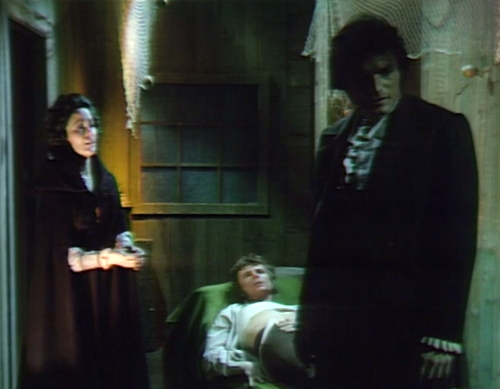
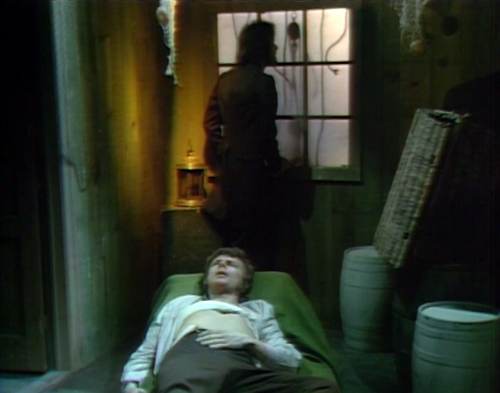

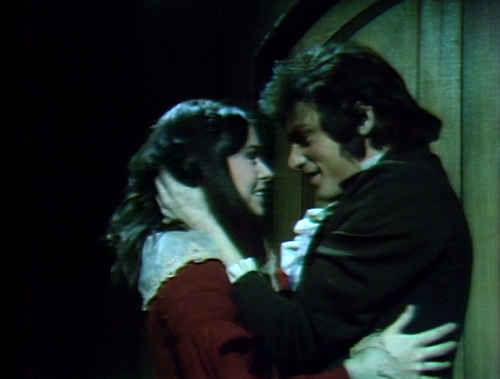
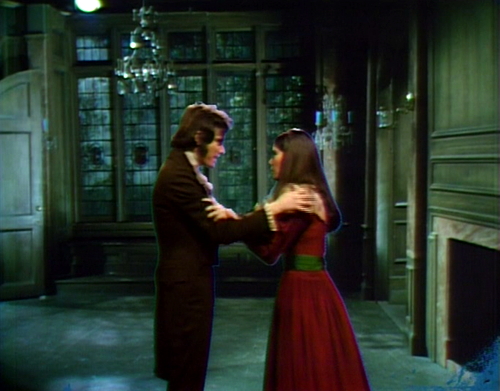
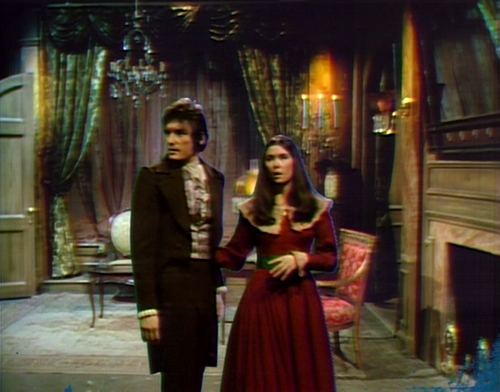
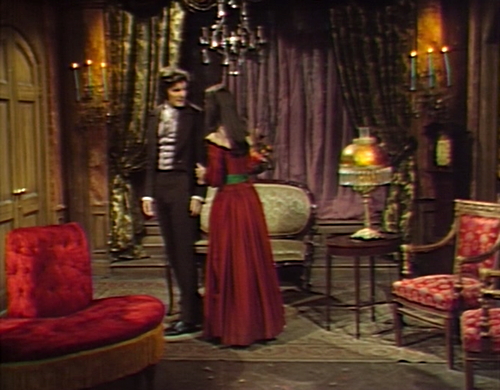
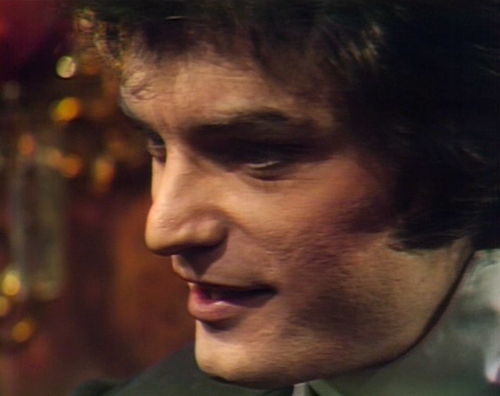
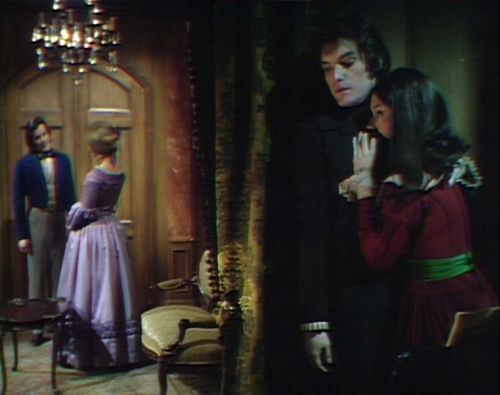
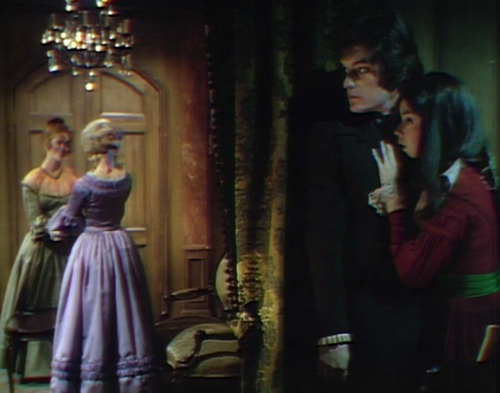
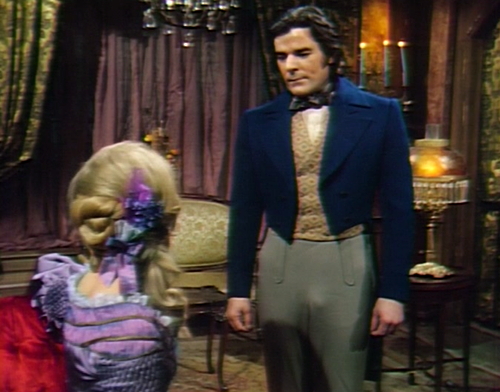
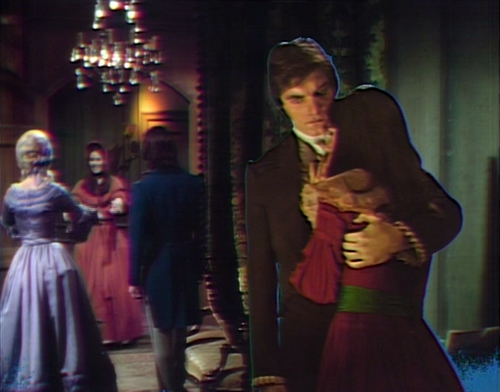
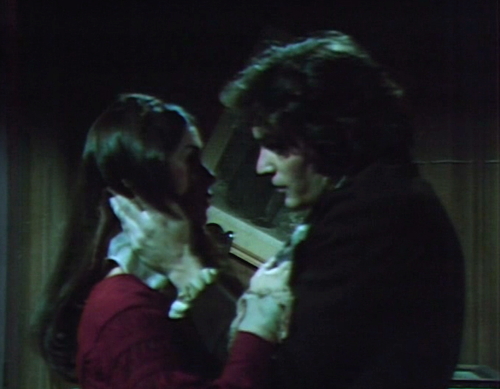
Well the one thing I disagree about is not caring about Desmond and Leticia. I LIKE Desmond and Leticia! For one thing John Karlen and Nancy Barret can act. D&L also have chemistry and are fun characters, when not being thrown in jail. I’d far rather watch them than Quentin and Daphne. Karlen and Barret also save PT for me as well and PT needs a LOT of saving.
I’m okay with caring about vertical Desmond. Horizontal Desmond does very little for me.
I bet Horizontal Desmond might do something for you…
but you’ll need to buy him a few drinks and tell him he’s pretty. 🙃
sing it, Percy’s Owner. i ever so agree. and meanwhile, vertical or horizontal, or eight inches down, our Mr. Horn is on a roll. vintage Danny at his adorable best.
Agreed; I would watch any PT spin off with John and Nancy playing all their characters at once; like Greater Tuna but with Chromakey and ghosts.
In the pic of Quentin and Daphne in the parallel time room (the one where they are actually on the set, not chroma keyed in) it looks very much like Quentin is wearing modern day sneakers! ( at least in this long shot)
Zoom in on the picture; Quentin is standing on a brightly lit white area of the rug, wearing dress shoes. (Though I did like the idea that he was in his Chuck Taylors (or Keds).)
Ah I see, yes that makes more sense than Keds!
Since Parallel Time is where people have made different choices, does 1840 non-PT Morgan dress right? I mean, I know that’s how 19th century trousers worked (I read somewhere that when 19th century West Point cadets were fitted for their dress uniforms, the tailors would ask which side they dressed on so they could leave the extra room), but come on…
Doesn’t look like there’s any “extra room” in those trousers, anyhow… 😳
My guess is that non-PT Morgan doesn’t even exist. He’s the PT result of some Collinses getting married and having kids (perhaps one or two generations earlier) that didn’t marry and have kids in non-PT. But his endowment always struck me as a surprising thing to be displayed so prominently and so often on TV back then. Perhaps it was the result of the loosening up of standards during the late sixties.
I don’t remember if they say where Morgan came from. Millicent might not have gone mad and Joshua was angling for Jeremiah to marry her, so that’s one possibility. Jeremiah could have married someone else and had kids. Heck Sarah could have grown up and married a distant cousin to keep the money “in the family”.
SPOILER
—
Morgan, Quentin, and Gabriel are siblings in the Parallel World. Justin and Flora are their parents.
There is no real attempt to make any sense of it on the show, and this is not the place for theories so I’ll reserve mine.
Re: “…this is not the place for theories…” Really? If that’s the case, I have massively misread the room. Considering that comments on this post are discussing which actor showed the most ahem “talent” on the show, I don’t know why you think your theories on the PT Collins family would be any less interesting. Personally I love a good Dark Shadows theory, but it’s Danny’s blog. And the judges say…?
Back in the first time travel storyline we suddenly knew several of the male characters rather well–I can see where Edmonds got his nickname, Big Lou.
While it’s not a continuity error per se, when Quentin says, “…perhaps it’s impossible for you and the Daphne of that time to be in the same place at the same time” he’s just pulling that out of his butt. 1970 Julia enters PT and kills 1970 PT Julia in #1036.
Goodness, I think some of the viewers may have gotten pregnant as well! Guess we know now why Morgan wants to get married right away. He needs to get a bit of the other IMMEDIATELY! (Or maybe it’s fashionable in PT to wear a codpiece in one’s trousers?)
Quentin’s parallel time occupancy theory doesn’t account for Julia killing her parallel self in 1970. But then, Dr. Julia Hoffman doesn’t give a rat’s patootie about anyone else’s theories.
And I bet Professor Stokes knew all about the Weissman theory, but figured it would sound cooler coming from T. E. Stokes. (What the heck, Weissman was dead by then, so screw him. He didn’t even appear on Dark Shadows anyway.)
I shall look forward to Justin Collins’ rendition of ‘Hello, my baby, hello my honey, hello my ragtime gal!’
Maybe there’s a Parallel Roxanne who can give accompaniment on the spinet?
Regarding the back forty…A square mile is 640 acres. This is rural Maine. I could easily see the estate covering the better part of a square mile. Even a half mile on a side is 160 acres.
Unfortunately, Shadows on the Wall doesn’t give an acreage. In an early episode, the short cut from the New House to the Old House is described as “past the greenhouse, through that clump of trees” to a fence, then a quarter mile further on, so 100+ acres is entirely credible. The grounds of Collinwood contain the Old House and the New House, as well as Seaview and the houses Blair and Lang stayed in (https://darkshadows.fandom.com/wiki/House_by_the_sea) — that implies a reasonable area to scatter them over.
For comparison, the grounds of Lyndhurst (Parallel Movie Time Collinwood) cover 67 acres, although the park containing Greystone (Parallel TV Time Collinwood) is only 18.3 acres.
Morgan is short for “more organ!”
Just to continue to lower the tone here… The continuing display on the part[s] of many male characters has, [cheap drumroll here] given rise to several questions around here. There have been prolonged periods of no Regency/Empire peek-a-boo, but now Morgan has returned to display mode. Hmph.
My daughter, who refers to classic Barnabas as NegaPimp–the cane/pimpstick, the vanity, the “languishing chair,” and so on–asked the question as to why Selby and Frid manage to arrange themselves, uh, rather more conventionally tastefully. One wonders.
C’mon, Joshua and Lt. Forbes were both pointedly displaying their assets (rim shot) in 1795. I suspect that Nathan might even have managed to impregnate Millicent (“Oh, I am RUINED!”). Joshua and Daniel may have sold the child to the Gypsies (I haven’t decided on that part.)
Oh, lawd yes, I believe Lt. Forbes owns any and all titles here. And I do recall a little visit from Big Lou as well.
But my lurid/prurient question remains, Selby and Frid? C’mon, those of you of the gentleman gender, you have more experiential, shall we say, knowledge here…
There are so many variables: how tight the pants are, the type of underwear (if any) one is wearing, the size (to be blunt) of one’s endowment, and how one “arranges” it. Any or all of these, or any combination thereof, could explain so much.
When the dead calves show up in the beginning of the Dark Shadows story line, Roger comments that the Collins family owns “farms.” Maybe one of those is on the back 40. Or something.
Yeah, don’t you know Mrs. Johnson just hated it every time Roger told her to go plow the back 40?
LOL! Prior to Mrs. Johnson, did Matthew Morgan get assigned all the farm chores? Maybe we were supposed to believe that they had a farm foreman who took care of running the farm(s).
That would explain why Matthew Morgan was so murderous!
They worked so hard to give the impression that Collinwood was surrounded by a forest. Lord knows they walked around on enough woodsy sets, being attacked by werewolves and monsters and what not.
“Back forty” is more Ode to Billy Joe, with images of choppin’ cotton and bailin’ hay! Just seems like an odd way for Quentin to describe his mansion’s backyard.
“After the publication of my initial monograph on the subject I received a letter from a woman in which she explained her interpretation of my ideas as follows: ‘If I understand your theory correctly, time is like a road, and parallel to it, there’s another road. On one, we live the lives we know, but on the other road, our lives are different, because we’re in a different time band, and we’ve made different choices. For example, in that other band of time, I could have made a different choice when I was at college. Instead of being a doctor, I could have married and had children.’
“Ignoring the notion of a woman attending medical school, this is not quite correct. In my theory, time is not like a set of parallel roads, it is like the branches of a tree, or even better the branching tributaries of a river delta. To travel to the past would be analogous to moving upstream, and to change the past would be like coming to a fork in the river and going right rather than left. Having moved to a different branch of the stream, one would not be able to return to where one originally came from downstream.
“Allow me to illustrate. Let is suppose that Alice lives in the far distant future year of 1970 (perhaps she is even a doctor). By some means she is able to travel upstream to our year of 1840, where she meets Bob. Up to this point, Bob and Alice have a shared past — the events of 1796, say, will have been the same in both their pasts. Then Alice and Bob come to some decision point, and the event goes differently than it did in Alice’s past in 1970. Alice and Bob in 1840 have gone to the right rather than to the left, as it were, and the 1970 Alice came from is no longer accessible to her; she can only float downstream to one of the 1970’s that can be reached in this different part of the river delta.” — Prof. Ernest Weissman (University of Vienna), “Über die Möglichkeit, die Vergangenheit in der Theorie der gleichzeitigen Zeitbänder zu ändern” (“On the possibility of changing the past in the theory of Concurrent Time Bands”), privately published, Vienna, 1840.
Dr. Weissman’s pamphlet is quite rare — in fact, the few reference bibliographies that mention it indicate that the only known copy was destroyed with the rest of the archives of the Weissman Institute during WW2. Having used the I Ching trance to read the copy in the Special Collections room of the Miskatonic University Library, however, I realized that his theory allows the cleaning up of various issues in the continuity of Dark Shadows.
Consider one of the most spectacular pieces of what Danny refers to as “meanwhiling” — Magda retrieving the Collins family history book from the ruins of the Collinsport Colonial court house in 1897. It would be hard to find just a snippet to convey the true insanity of the meanwhiling here, so I’ll just point to Danny’s blog post: https://darkshadowseveryday.com/2015/12/26/episode-797/
If we’re gong to play the Dark Shadows equivalent of the Sherlockian game (https://en.wikipedia.org/wiki/Sherlockian_game) — play “Widow’s Hill Irregulars” as it were — we have to accept as an objective in-universe fact that in 1897 Barnabas said, “Magda — I said that it didn’t happen too long ago… but that hasn’t happened yet!” We do not, however, have to accept that he was right.
So let’s look at some of the events of 1968/1796 in terms of Weissman’s theory. As of #624 we are in a timeline where Angelique had sent Eve back in time to a 1796 where Vicki had been executed and Peter is in jail waiting for his turn. This is where Eve brings the history book forward.
Then #662-66 happens — Barnabas goes back to 1796 to a point earlier in time than the one Eve had gone back to and changes things: Peter is released from jail, Vicki is revived after appearing to be dead, and they get their futile happily-ever-after-until-1797-Jeb time together. And now we’ve gone left rather than right. As explained by Prof. Weissman above, the 1968 that Barnabas returns to is not the 1968 he came from. It is a 1968 where Eve never went back to visit Peter after Vicki’s death and before his hanging because this is a 1968 where that never happened in 1796. The 1897 Barnabas goes back to is one where the history book has been sitting in the ruins of the courthouse all along. No meanwhiling involved, Barnabas is just confused.
The well of Dark Shadows continuity problems is deep, and for all I know someone other than Barnabas (who experienced both timelines) refers to Eve’s trip after #667 — in which case all I can do is wrap my arms around my knees, gently rock back and forth, and quietly sing the Mystery Science Theater 3000 theme song to myself: “If you’re wondering how he eats and breathes, and other science facts (la, la, la!), just repeat to yourself, ‘It’s just a show, I should really just relax…'”
Meanwhile, here in reality Weissman’s “Parallel Time” theory was independently discovered (by Hugh Everett in his 1957 thesis) as a way to resolve the measurement problem in Quantum Mechanics (https://en.wikipedia.org/wiki/Many-worlds_interpretation; https://www.scientificamerican.com/article/hugh-everett-biography/). The question of personal identity in the context of the Many Worlds interpretation — what it means to talk about “me”, why do “I” only experience one branch of reality — is a complicated one (https://www.wired.com/story/sean-carroll-thinks-we-all-exist-on-multiple-worlds/, https://www.quantamagazine.org/why-the-many-worlds-interpretation-of-quantum-mechanics-has-many-problems-20181018/). With regard to whether Parallel Time is accessible in the real world, the first Alternate Reality Game revolved around this (and had some actual QM physicists involved to some degree in its creation). The Wikipedia page for Ong’s Hat (https://en.wikipedia.org/wiki/Ong%27s_Hat) is a good place to start if you want to go down that rabbit hole.
While we’re talking about time travel in Dark Shadows…the blog is vast, so I’m not sure this has ever been discussed, but while I understand Danny’s concerns about cultural appropriation in https://darkshadowseveryday.com/2015/08/09/episode-700/, the I Ching trance is not something the Dark Shadows writers pulled out of their butts. William Seabrook describes it in his 1940 book Witchcraft: Its Power in the World Today (quoted in https://allaboutheaven.org/observations/using-the-i-ching-001373/221).
I had always assumed that this source was where the writers got the idea from, as later in the same section he describes a woman doing the I Ching trance having a bad trip that reminded me of the story Tate tells Petofi in #842. Rick Lai suggests (https://lovecraftzine.com/2013/12/10/the-collinsport-horror-dark-shadows-and-the-cthulhu-mythos-by-rick-lai/) that the idea came from a story by Seabury Quinn, “The Door Without a Key” (Weird Tales, September 1939, https://nyc3.digitaloceanspaces.com/sffaudio-usa/usa-pdfs/TheDoorWithoutAKeyBySeaburyQuinn.pdf). In addition to using the I Ching trance for time travel, it involves a Vicki/(Peter Bradford/Jeff Clark) plot twist at the end.
In case anyone made it through to the end here — here’s something Dark Shadows adjacent that’s worth checking out: https://www.youtube.com/watch?v=9cXNghQR3h8. This failed-pilot-turned-TV-movie was apparently explicitly intended as Dark Shadows meets Dynasty. If for nothing else, interesting for showing what you get if you don’t do obnoxious lighting and have an art director who goes with an overstuffed lived-in-for-a-couple-centuries look for Greystone (’91 and ’04 Collinwood). Having stumbled across this over the weekend, I have very vague memories of watching it when it aired. If Danny gets to an episode of 1840 PT where he thinks, “I can’t even…” maybe he’ll review it 🙂
thank you, Karl, for sharing all with us. and for the Dark Mansions, too.
how utterly fascinating of you.
…all this with us (in other branch, mayhaps i said it right.)
My main question is, how did Weissman manage to fit all that into a pamphlet?
Think “pamphlet” more like the “Welcome to your new Windows 10 laptop” or “Getting to know your new Android smart phone” pamphlet they put in the box rather than the “Do you know where you’ll spend eternity” type of pamphlet you find under your windshield wiper 🙂
I love this post to bits. But if I understand you correctly, when you say that ‘time is like a road, and parallel to it, there’s another road..,’ does that also mean…
…that life is a highway, and we’re going to drive it all night long?
Or it’s been a long road getting from there to here?
ducks and runs
It’s interesting that you quote the ST: Enterprise theme, because I’m in the minority of fans that love it to bits. Maybe it’s because I’ve seen the world go from handing your deck of punch cards to the High Priest of the Mainframe and paying per second of computer time to having a phone in my pocket that’s probably more powerful anything the NSA had 50 years ago, but I get a little misty every time I watch that opening credits montage going from people settling Polynesia in a reed boat thru the sailing ship and the aircraft carrier and the space shuttle and then the Trek universe early Enterprises.
Oh, don’t get me wrong: the opening montage is one of the most affecting title sequences of a ST series ever. The music from PATCH ADAMS, though…that needs to go. I much prefer the ending music, which was the original choice for the opening anyway. Someone on YouTube put them together, and they’re gorgeous.
To continue the parallel time topic, I loved when they changed the opening montage on the Mirror Universe episodes of ST Enterprise.
Yesssss! The dark world credits and theme were amazing.
It was better than the normal show’s, which is kinda sad.
Too bad the normal opening credits sucked.
A very well-done explanation of the Many Worlds theory! Thanks for that.
Back 40 is a farming community term. It just means like out back. The old house is in the “back 40.” The old house is out back of the mansion. Like that. I wouldn’t take it as needing to be tied to any specific measurement (although of course originally it meant a back field of 40 acres). Especially on “Dark Shadows.” It does imply a farm type area though so it could mean something like the pasture where they kept their horses. That kind of thing. One of the writers probably dropped it in from a movie about a farm they saw once. LOL The farms must run on the same structure as businesses on soaps today where it’s people off screen that actually get any work done. I keep waiting for the people actually doing the work to stage a coup, but they haven’t yet.
Quentin does mention the “back 40” is densely wooded. So perhaps the Collins family was growing Xmas trees there, or perhaps harvesting maple syrup – – do you suppose they had a logging concern? (Didn’t Joshua mention shipbuilding?)
I just like the idea that the Collinsport police would have simply ignored any spot on the property that had too many trees.
“I don’t like this forest. It’s dark… and creepy!”
Dorothy Gale, in ‘The Wizard of Oz’ (1939)
True – it is called CollinWOOD, after all. Maybe it’s because I grew up in the rural south that I think of back forty as meaning cultivated farm land. Plus, 1840’s Quentin was the lord of the manor and would be knowing about family holdings more than playboy 1897 Quentin who spent all his time in the house, listening to records and drinking.
When Barnabas first arrives at 1967 Collinwood, Barnabas cites shipbuilding as the line of work he is in. He asks Roger for some investment advice on local shipbuilding businesses. The viewer can almost see the $$ signs in Roger’s eyes.
I don’t know if Joshua cited shipbuilding, too.
I seem to remember that was why Lt. Forbes was in Collinsport; a naval contract (?) I better check back through the posts here, I think there was some discussion about whether the U.S. had organized a navy in 1795, or was awarding contracts…
Too bad Morgan isn’t in the army; plenty of lines about privates on parade.